The all-important task of buying the best motherboard for i9-11900K is something that falls upon every PC builder. A motherboard is the primary base-building block that binds everything together in a build. It plays a major role in controlling the power supplied to the CPU, keeping the system thermally efficient, and ensuring seamless coordination between all the components. Ever since the launch of the Z590 chipset that offers PCIe 4.0 support, the market has become flooded with abundant options.
Intel never fails to amaze us with its mind-blowing processors that always manage to take the market by storm. They rolled out the Rocket Lake CPUs to compete with AMD’s Ryzen 5000 CPUs, with a rather heavier price tag than their competitors. Nonetheless, this 8-core and 16-threaded monster processor has incredible single-core performance and provides immense overclocking capabilities. It might be outplayed by Ryzen when it comes to multi-core scores, but gaming is its main territory. Thus, it is undoubtedly a dream processor for every gaming enthusiast out there.
Best Motherboard For i9-11900k: Our Top 7 Picks
| # | Preview | Product Name | Award | Details |
|---|---|---|---|---|
| 1 | 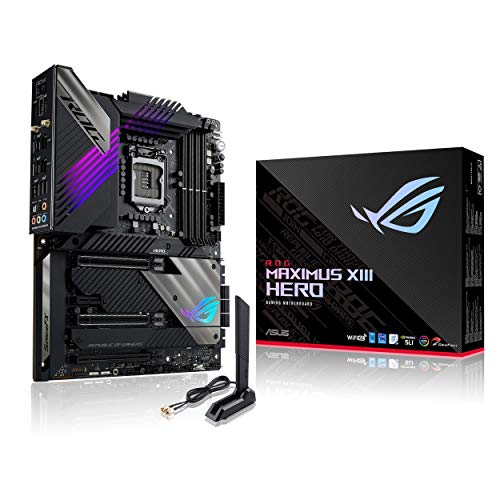 |
Asus ROG Maximus XIII Hero | Best Overall Motherboard For i9-11900k | Check Price |
| 2 | 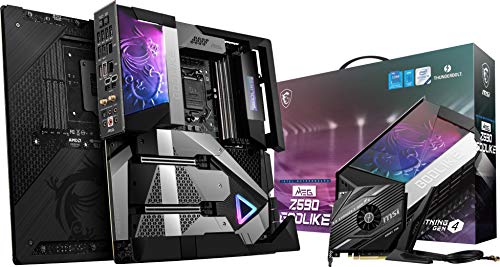 |
MSI MEG Z590 Godlike Gaming | Best Overclocking Motherboard For i9-11900k | Check Price |
| 3 | 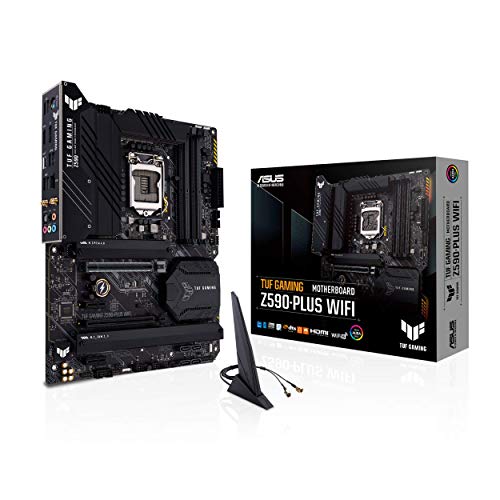 |
Asus TUF Gaming Z590 Plus Wi-Fi | Best Gaming Motherboard For i9-11900k | Check Price |
| 4 | 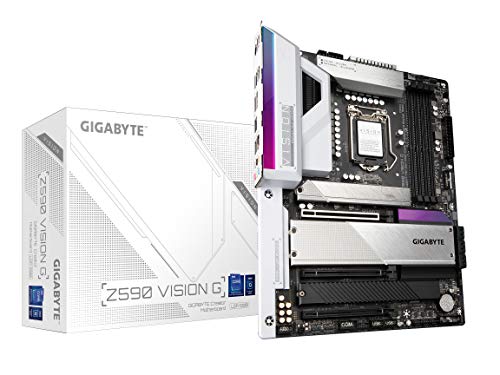 |
Gigabyte Z590 Vision G | Best Looking Motherboard For i9-11900k | Check Price |
| 5 | 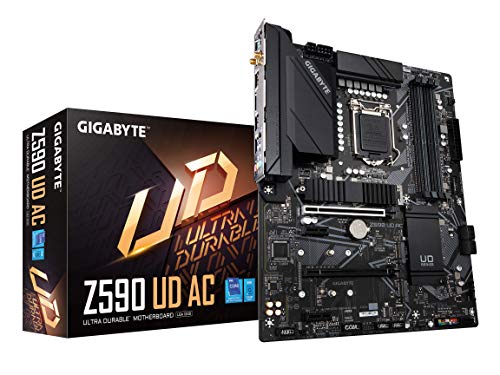 |
Gigabyte Z590 UD AC | Best Budget Motherboard For i9-11900k | Check Price |
| 6 | 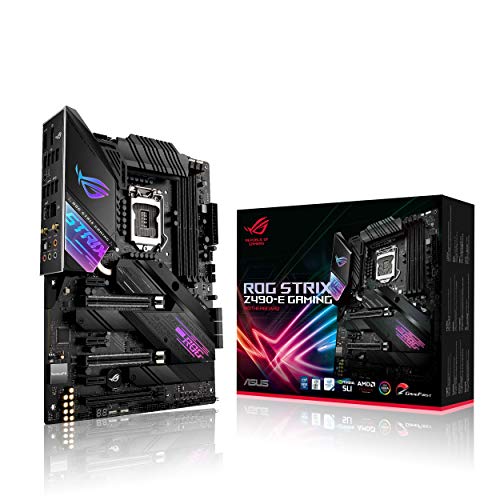 |
Asus ROG Strix Z490-E Gaming | Best Z490 Motherboard For i9-11900k | Check Price |
| 7 | 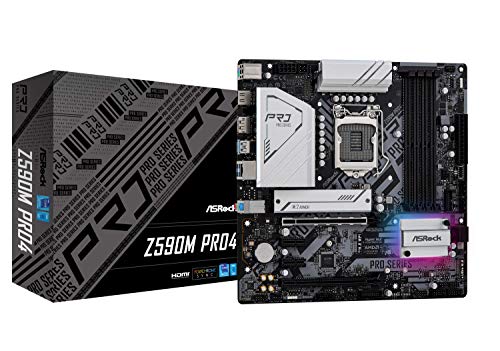 |
ASRock Z590m Pro4 | Best Micro-ATX Motherboard For i9-11900k | Check Price |
| # | 1 |
| Preview |  |
| Product Name | Asus ROG Maximus XIII Hero |
| Award | Best Overall Motherboard For i9-11900k |
| Details | Check Price |
| # | 2 |
| Preview |  |
| Product Name | MSI MEG Z590 Godlike Gaming |
| Award | Best Overclocking Motherboard For i9-11900k |
| Details | Check Price |
| # | 3 |
| Preview |  |
| Product Name | Asus TUF Gaming Z590 Plus Wi-Fi |
| Award | Best Gaming Motherboard For i9-11900k |
| Details | Check Price |
| # | 4 |
| Preview |  |
| Product Name | Gigabyte Z590 Vision G |
| Award | Best Looking Motherboard For i9-11900k |
| Details | Check Price |
| # | 5 |
| Preview |  |
| Product Name | Gigabyte Z590 UD AC |
| Award | Best Budget Motherboard For i9-11900k |
| Details | Check Price |
| # | 6 |
| Preview |  |
| Product Name | Asus ROG Strix Z490-E Gaming |
| Award | Best Z490 Motherboard For i9-11900k |
| Details | Check Price |
| # | 7 |
| Preview |  |
| Product Name | ASRock Z590m Pro4 |
| Award | Best Micro-ATX Motherboard For i9-11900k |
| Details | Check Price |
Last Update on 2021-09-28 at 20:32 / Affiliate links / Images from Amazon Product Advertising API
Needless to say, the 11900K is an extremely power-hungry CPU that demands a solid motherboard to unleash its full potential. A motherboard that can’t keep up with the flagship 11900K CPU would create a bottleneck situation, and that’s not something we want. In order to find the perfect motherboard for your processor, you should have a bit of knowledge about every option at hand. To make things as easy as possible, we have outlined the quirks and features of seven of the best motherboards for i9-11900k. This detailed guide will help you in your quest for finding the most suitable match for your processor. However, if you are still rocking an older-gen processor, then you might want to check our best motherboard for i7-6700k guide.
1. Asus ROG Maximus XIII Hero
Best Overall Motherboard For i9-11900k
Pros
- Premium Look
- Excellent Overclocking Headroom
- Two Thunderbolt 4 Ports
- Dual LAN
Cons
- Only Six SATAIII Ports
Form Factor: ATX | Chipset: Z590 | Memory: 128GB 5333MHz | Storage: 4x M.2, 6x SATA | Expansion Slots: 2x PCIe 4.0 x16, 1x PCIe 3.0 x16, 1x PCIe 3.0 x1 | USB Ports: 2x Thunderbolt 4 Type-C, 6x USB 3.2 Gen2 (Type-A), 2x USB 2.0
When it comes to producing high-quality motherboards, Asus is always found to be one step ahead of its competition. The ROG Maximus XIII Hero from Asus claims the throne on our list, with a truly impressive feature set offered at a slightly high price tag.
Just by looking at the Maximus XIII Hero, one can decipher that this is a premium motherboard. We see an all-black theme with a bit of aluminum on the heatsink area. The board is covered with massive heatsinks that add an aggressive touch to the aesthetics. On the shroud, we see RGB streak accents along with the ROG branding in large font. The chipset heatsink is made out of glossy aluminum and has a backlit ROG emblem on it. You can also attach additional RGB components to enliven things up a bit. All in all, the design is quite sleek and it surely is our personal favorite out of the lot.
Related Guide: Best Motherboards For i9-9900k
Things only get better when it comes to the performance of this beastly motherboard. It packs a 16-phase VRM (14+2 configuration) powered by a state-of-the-art Renesas ISL69269 controller. Its robust power delivery solution ensures optimal performance for a power-hungry CPU like the i9-11900K. A solid VRM only delivers when it is backed up by a highly efficient heatsink design, and the Maximus XIII Hero has got just that. An L-shaped heat pipe connected to massive heatsinks is used to draw heat away from the components. A thermal pad is installed for better heat dissipation, and all four M.2 slots also have their own dedicated heatsinks. That being said, you can do some serious overclocking on your 11900K without thermal throttling becoming an obstacle in your way.
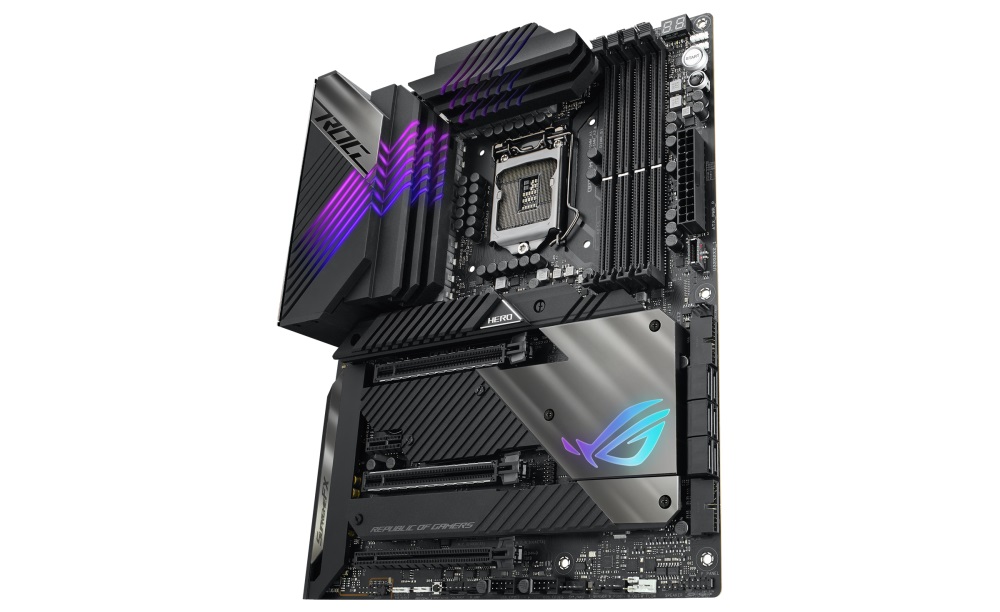
In terms of memory, you get the usual dual-channel setup of 4 DIMM slots offering up to 128GB RAM @5333MHz. The Z590 is the first series of Intel boards with official support for PCIe Gen4, an upgrade from the Z490 series. Interestingly, the Hero is equipped with four M.2 slots, two of which run at PCIe 4.0 x4 speeds. These two slots share their bandwidth with the proprietary PCIe slots, while the fourth slot shares lanes with two SATA ports. Speaking of SATA, you get six SATA3 6GB/s ports, which is a bummer as you’d generally expect eight at this price point. For the graphics, we have two long PCIe 4.0 slots supportive of two-way Nvidia SLI, along with an additional PCIe 3.0 x1 slot. Again, there’s a lot of bandwidth sharing going on, so be mindful of that before buying.
The I/O panel features 10 USB ports, including 2 Thunderbolt 4 Type-C ports rated at a stunning 40GB/s. There’s also six USB 3.2 Gen2 ports, along with HDMI, optical SPDIF, and five analog audio jacks. You get two Intel 2.5GbE ethernet ports along with speedy WiFi 6E technology at your disposal. The Hero makes use of the SupremeFX ALC4082 audio codec to provide rich sound quality. Other notable features include 8 fan headers, 3 RGB headers and Q-code debug LEDs to help out with the diagnostics.
It can be safely concluded that the Asus ROG Maximus XIII Hero is a product of incredible aesthetics combined with remarkable performance. Although a bit expensive, it excels in these two criterias and that’s what makes it the best overall motherboard for i9-11900K.
2. MSI MEG Z590 Godlike Gaming
Best Overclocking Motherboard For i9-11900k
Pros
- Superb Aesthetics
- Extremely Robust Power Delivery
- Four M.2 Slots
- 10G Super LAN Port
Cons
- Extremely High Priced
Form Factor: ATX | Chipset: Z590 | Memory: 128GB @5600MHz | Storage: 4x M.2, 6x SATA | Expansion Slots: 2x PCIe 4.0 x16, 1x PCIe 3.0 x16 | USB Ports: 2x Thunderbolt 4 Type-C, 2x USB 3.2 Gen2 (Type-A), 6x USB 3.2 Gen1
The Z590 Godlike Gaming from the Taiwanese motherboard masters, MSI, claims the second spot on our list. It is from the flagship Godlike lineup and comprises high-end features and premium build quality.
The name ‘Godlike Gaming’ seems very dominating, and such is the look of this motherboard which dominates your RIG’s aesthetics. It features an all-black PCB with shiny silver-finished VRM and M.2 heatsinks. The MSI Dragon theme is artistically carved into the rear I/O cover which is also RGB lit. Another triangular RGB zone is present over the chipset heatsink. To the right of the DIMM slots, there is the Dynamic Dashboard II OLED Panel that shows the motherboard’s progress which can also be customized as per one’s liking. The RGB is customizable via the MSI Mystic Light software.
MSI has made sure that there are no compromises in the power delivery department. There is absolute robust power delivery courtesy of the 20+1 digital power phases with 90A smart power stage. It is also extremely necessary to keep the VRMs cool to which MSI’s answer is the stacked wavy fin heatsink design with 7w/mK thermal pad. The two heatsinks are also connected via an 8mm heat pipe which increases the surface area for better heat dissipation. A massive aluminum backplate is also installed at the back of the 8 layer PCB to ensure low thermals of the MOSFETs. Further addition of an actively cooled chipset heatsink makes it an overclocker’s dream.
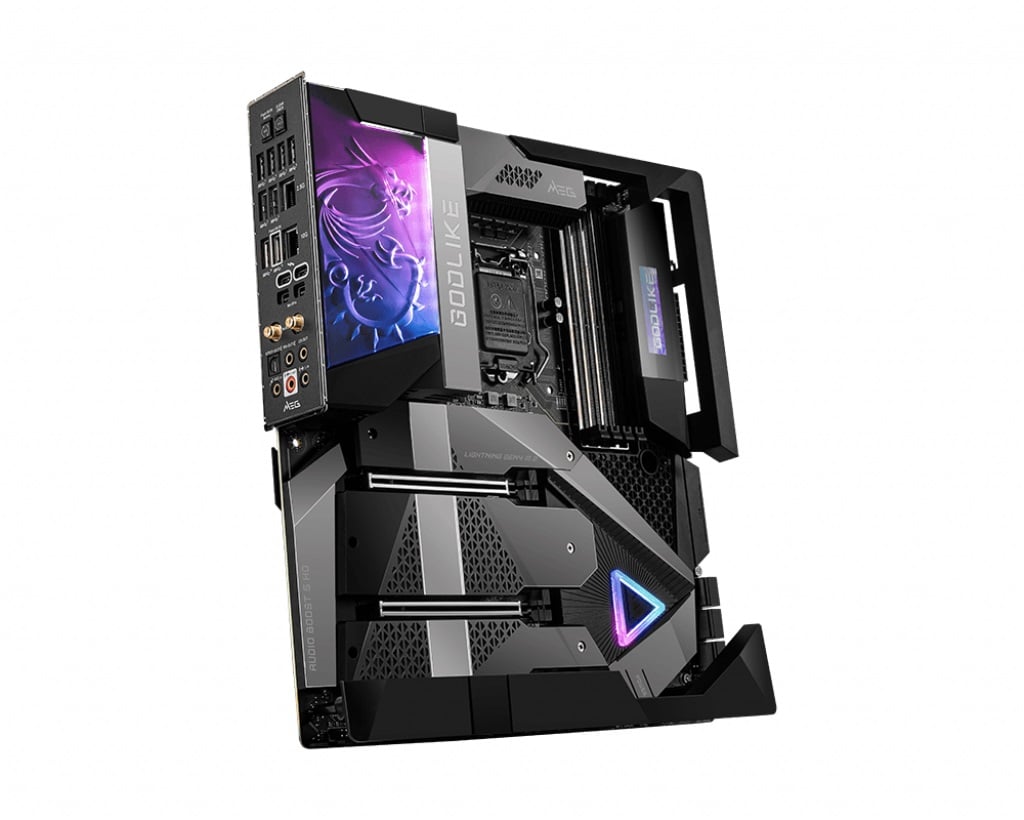
As for the expansion slots, The Godlike gaming is equipped with two PCIe 4.0 x16 slots and one PCIe 4.0 x4 slot, which is used for M.2 drives. Whereas, rest of the slots, namely the PCIe x16 and three M.2 slots, conform to the Gen3 technology. All the full-length slots are steel armored for the protection of your cards. Lastly, the M.2 slots are all covered with a double side shield frozr, while the second and third slots share the heatsink. The memory department is more than sufficient with the four DIMM slots supporting up to 128GB of RAM at 5600MHz speeds.
Moving on to the rear I/O panel, it is extremely richly equipped with the two thunderbolt 4 USB-C ports being the main highlight. It also includes six USB 3.2 Gen1 ports and two USB 3.2 Gen2 Type-A ports. Moreover, there is also dual LAN support with one 10G Super LAN for lightning-fast speed. The latest Wi-Fi 6E solution is included which also has Bluetooth 5.2 support which provides up to 6GHz speed. MSI has smartly added two mini DisplayPorts which take up less space in contrast to the full-sized ones. Lastly, the audio solution powering the five audio ports is the flagship Realtek ALC4082 codec.
More Intel Motherboard Guides: Best Motherboards For i7-8700k
In conclusion, the MSI Z590 Godlike Gaming is an excellent pick for the overclock enthusiasts due to its robust VRM and absolutely premium thermal design. It is undoubtedly the best overclocking motherboard for i9-11900k. However, the only setback is the extremely high price which also makes it lose the first spot on our list of the best motherboards for i9-11900k.
3. Asus TUF Gaming Z590 Plus Wi-Fi
Best Gaming Motherboard For i9-11900k
Pros
- Reliable VRM
- Easy-To-Use BIOS
- 5000+MHz Memory Speeds
- Onboard Wi-Fi
Cons
- Only 7 USB Ports
Form Factor: ATX | Chipset: Z590 | Memory: 128GB @5000+MHz | Storage: 3x M.2, 6x SATA | Expansion Slots: 1x PCIe 4.0 x16, 1x PCIe 3.0 x16, 2x PCIe 3.0 x1 | USB Ports: 2x USB 3.2 Gen2 (Type-A), 1x USB 3.2 Gen2 (Type-C), 2x USB 3.2 Gen1, 2x USB 2.0
Moving on, we have yet another entry from Asus, particularly the TUF Gaming Z590 Plus Wi-Fi. Asus’ TUF lineup is a well-rounded budget substitute to the ROG Gaming series, offering an excellent value for your money.
Starting off with aesthetics, the TUF Gaming Z590-Plus Wi-Fi features a very clean jet black finish. It accurately demonstrates how a design so simple yet subtle can make such a powerful impression. There’s a bit of RGB lighting on the right side of the board, which can be controlled using the company’s Aura Sync software. The TUF GAMING branding can be found on the shroud and the chipset heatsink, reminding everyone of this board’s identity. The heatsinks aren’t all that massive, but they do stand out on the board itself.
Under the hood, we have a 16-phase DrMOS VRM in a 14+2 configuration at work. Considering the price point, Asus definitely made an incredible move by giving customers a reliable 16-phase VRM in the TUF Gaming. The board is cooled by two decent-sized heatsinks. The cooling system is obviously not as efficient as the ROG Maximus XIII Hero, but it is sufficient enough for moderate overclocking. An adequate amount of fan headers are also provided to further improve the cooling system. Also, here is a guide on the Best CFM Case Fans in case you are looking to populate your fan headers. When subjected to a variety of tests, the TUF Gaming yields decent benchmarks on the all-powerful i9-11900K processor.
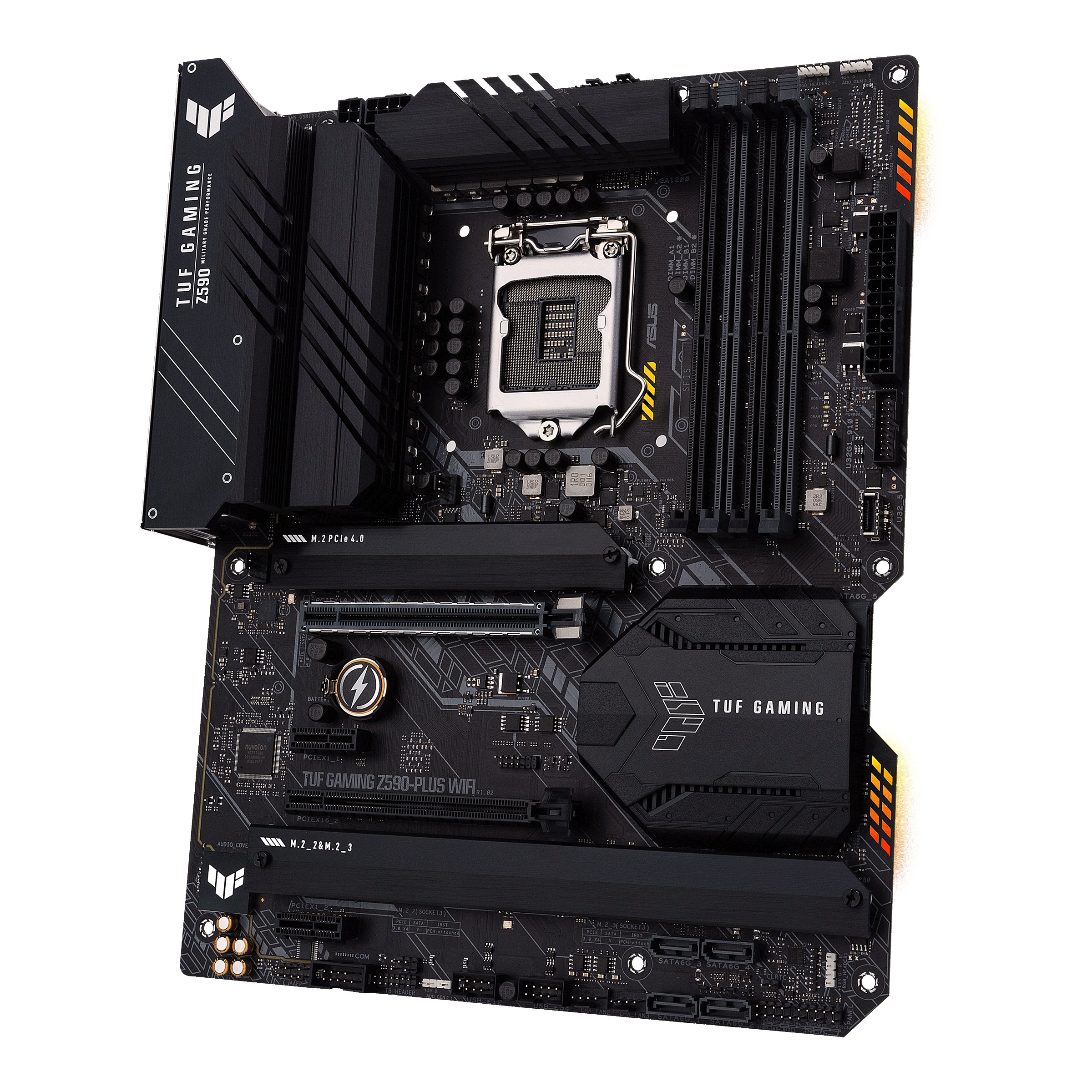
The TUF Gaming comes equipped with four DIMM slots capable of providing 128GB DDR4 at 5000+MHz speeds. The 5000+ MHz frequency is usually an attribute of higher-end motherboards, so that’s a nice feature to have. You also get 3 hyper M.2 slots with dedicated heatsinks for each. Alongside the M.2 slots are six SATA3 6GB/s ports, the standard setup that we also saw on the Maximus XIII Hero. The TUF Gaming is equipped with 1 full-length PCIe 4.0 x16 SafeSlot, 1 PCIe 3.0 x16 SafeSlot, and 2 PCIe 3.0 x1 slots. One notable feature of all Asus boards has to be their user-friendly UEFI BIOS, which takes consumer experience to another level.
The TUF Gaming Z590-Plus Wi-Fi isn’t all sunshine and roses, though. It slacks on a bit when it comes to the I/O panel, providing only 7 USB ports in total. However, you can use a USB hub to fix that. But other than that, this board ticks all the boxes which include HDMI, DisplayPort, PS/2 port, optical SPDIF and 5 audio jacks. It packs Intel’s I225-V 2.5Gb Ethernet, and the audio is managed by the Realtek ALC S1200A audio codec. Aside from that, Wifi 6 and Bluetooth 5.0 are also included in the package.
On that note, the Asus TUF Gaming Z590-Plus Wi-Fi is an excellent midrange option to set your eyes on. Its robust power delivery and a substantial amount of features make it the best gaming motherboard for i9-11900K.
4. Gigabyte Z590 Vision G
Best Looking Motherboard For i9-11900k
Pros
- Attractive Design
- Quad M.2 Setup
- 10 USB Ports
- PCIe 4.0 Support
Cons
- Not The Best Thermal Performance
Form Factor: ATX | Chipset: Z590 | Memory: 128GB @4800MHz | Storage: 4x M.2, 6x SATA | Expansion Slots: 1x PCIe 4.0 x16, 2x PCIe 3.0 x16 | USB Ports: 2x USB 3.2 Gen2 (Type-A), 1x USB 3.2 Gen2 (Type-C), 5x USB 3.2 Gen1, 2x USB 2.0
If the simplistic look of the TUF Gaming Z590-Plus doesn’t impress you, then the Z590 Vision G from Gigabyte would be the way to go. The Z590 Vision G features unique and unconventional aesthetics along with an attractive price point. These qualities make the Vision G a worthy contender on this list.
The aesthetics of this motherboard might not be for everyone, but once you fall in love with it, there’s really no going back. We see a black PCB with predominantly white heatsinks, and a bit of silver as well. The heatsinks are made out of brushed aluminum which looks quite attractive in our opinion. Apart from a single LED strip on the I/O cover, there is no integrated RGB, which is a serious setback. A unique design should be complemented with adequate RGB, but sadly that’s not the case with the Z590 Vision G. Regardless, the board looks quite slick and should blend in quite nicely with any gaming rig.
Just like its aesthetics, the Vision G also has commendable power delivery. It uses a 13-phase VRM design configured in a 12+1 layout with 70A MOSFETs. Not only the power delivery, but the thermal design is quite impressive as well. Two heatsinks are connected with the MOSFETs using a heatpipe and each of them has a different design. The top VRM is a solid aluminum piece whereas the other one is a finned heatsink. There is an all-in-one heatsink for the two M.2 slots and the chipset. However, the VRMs tend to run a bit hot compared to other boards on the list, so you might want to consider another board if you are into overclocking.
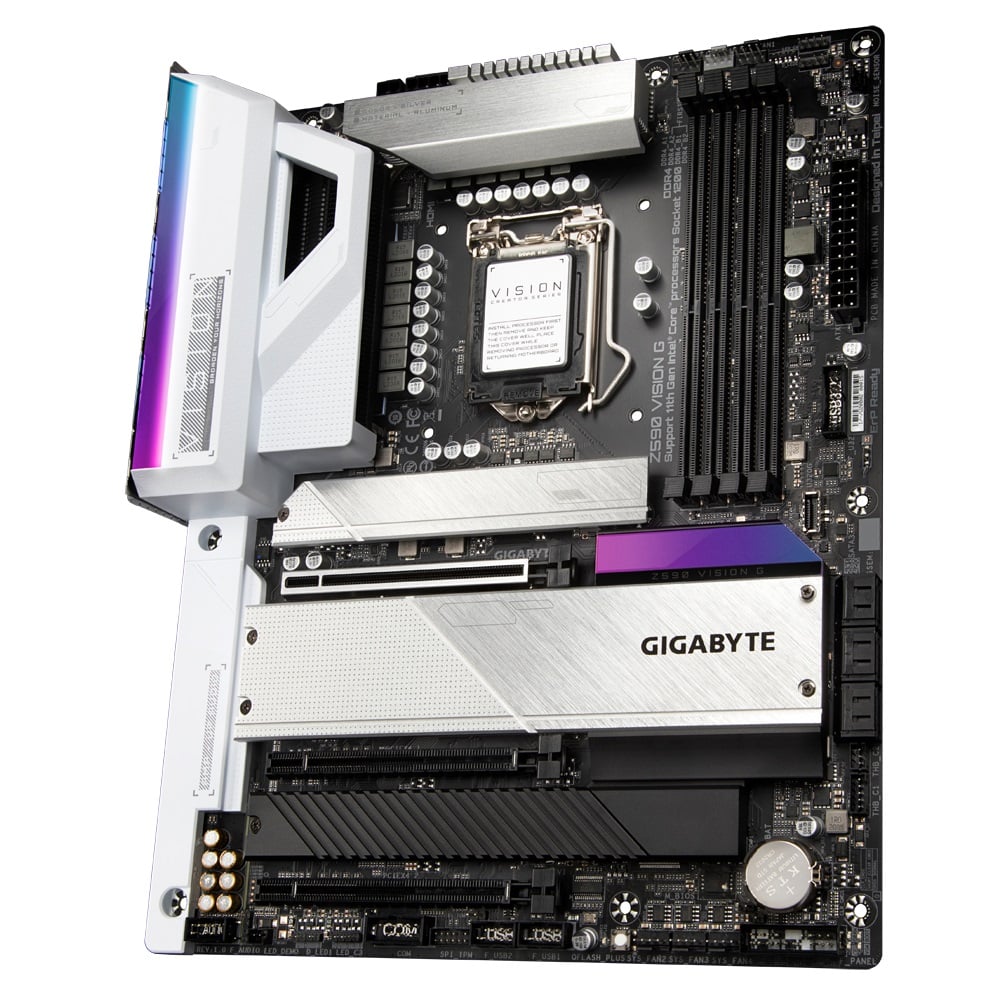
The Vision G sports four DIMM slots with a dual memory architecture that have a 128GB capacity at 4800MHz speeds. It also boasts a quad M.2 arrangement with a heatsink over each slot. The second and third M.2 slots have a shared heatsink. Out of the four slots, three of them support PCIe 4.0 whereas, the remaining one conforms to PCIe 3.0. Moreover, three full-length PCIe x16 slots are also available out of which the primary slot is a PCIe 4.0 and is also reinforced.
A Guide on SSDs: Best PCIe Gen4 SSDs
Moving on further, the rear I/O panel also carries the white theme of this motherboard. Not only does it look stylish but it is also well-equipped. The USB ports count tallies to ten with three USB 3.2 Gen2 ports (one Type-C), five USB 3.2 Gen1 ports (one Type-C) and two USB 2.0 ports. However, it lacks the thunderbolt port which could have been a nice inclusion. For wired networking, it has one RJ-45 LAN port using the Intel 2.5GbE LAN; however, there is no Wi-Fi module. It also lacks clear CMOS and BIOS flashback button(s), so the BIOS has to be installed using the conventional method. There are also a total of six audio ports that are fueled by the Realtek ALC4080 audio codec.
All things considered, the Gigabyte Z590 Vision G is an excellent pick for those who want form-over-function. While it might not be the best performing motherboard, it definitely is the best looking motherboard for i9-11900K.
5. Gigabyte Z590 UD AC
Best Budget Motherboard For i9-11900k
Pros
- 13-Phase VRM Design
- Shielded Memory Routing
- Grooves In VRM Heatsinks Increase Airflow
- Decent Overclocking Headroom
Cons
- No Type-C Port
- Bland Design
Form Factor: ATX | Chipset: Z590 | Memory: 128GB @5333MHz | Storage: 3x M.2, 5x SATA | Expansion Slots: 1x PCIe 4.0 x16, 1x PCIe 3.0 x16, 2x PCIe 3.0 x1 | USB Ports: 2x USB 3.2 Gen2 (Type-A), 4x USB 3.2 Gen1, 2x USB 2.0
The fifth spot on our list of best motherboards for Intel i9-11900K is populated by the Gigabyte Z590 UD AC motherboard. We all love a budget motherboard that does all the tricks required to run heavy processors like the 11900K. The Z590 UD AC is one of the cheapest Z590 offerings on the market, and it makes quite a strong case for itself.
In terms of looks, the Gigabyte Z590 UD AC is definitely not the best-looking motherboard out there. It features a simplistic, subpar design, but you really can’t expect mind-blowing aesthetics at such a rock-bottom price level. The board is all-black, with the ‘GIGABYTE’ and ‘UD series’ branding written in gray fonts. There is absolutely no RGB lighting on this board whatsoever. A blessing in disguise, though, is that this motherboard would smoothly blend in with any sort of PC build, unless you’re a fan of RGB. However, you can still add some addressable RGB fans to lighten up your build.
The Z590 UD AC is equipped with a 12+1 digital VRM solution with 50A DrMOS. No PWM doublers are used which means each power stage has a direct connection to the CPU, improving the transient response. It makes use of the extended VRM heatsink design along with grooves, to increase the airflow. Although it is a budget board, it still offers overclocking to some extent without thermal throttling, which is formidable.
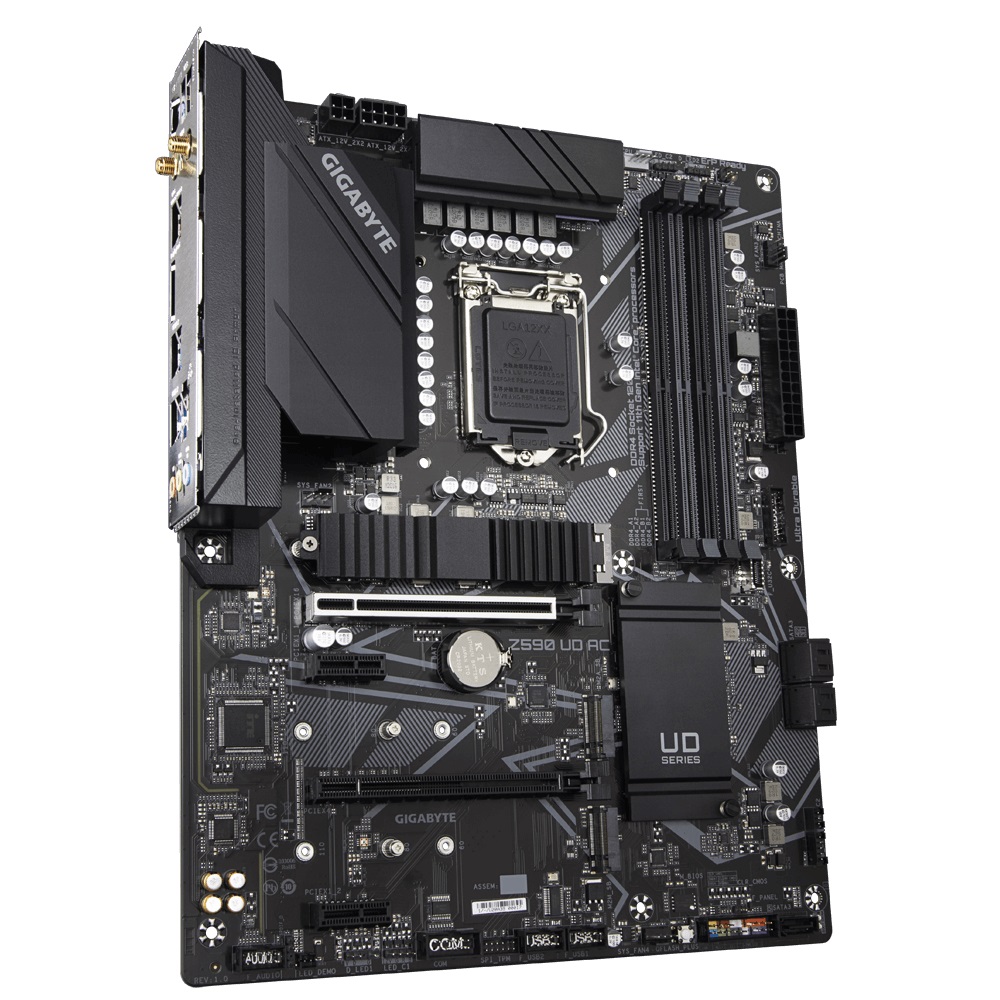
The four DIMM slots can hold up to 128GB of RAM at 5333MHz speeds. To further increase memory overclocking, the memory routing is shielded. There is a single PCIe x16 slot that is Gen4 compatible. The rest of the slots are all PCIe 3.0. As for storage, there are three M.2 slots along with five SATA3 ports. You also get Gen4 support for the primary M.2 slot so that you can experience lightning-fast boot times.
Taking a look at the back panel, we have eight USB ports including two USB 3.2 Gen2 ports however, no Type-C port is provided. Other than that, there are four USB 3.2 Gen1 ports and another pair of USB 2.0 ports. A 2.5GbE gaming LAN port is provided along with two SMA antenna connectors to take advantage of the 802.11ac Wi-Fi solution. The onboard graphics rely on the single DisplayPort.
To sum up, the Z590 UD AC provides all the basic features without draining your wallet. It can be easily proclaimed as the best budget motherboard for i9-11900K, although you’ll have to compromise a bit on performance.
6. Asus ROG Strix Z490-E Gaming
Best Z490 Motherboard For i9-11900k
Pros
- Inlcuded Fan For Heatsink
- Support For PCIe Gen4
- Well-Equipped Rear I/O Panel
- Onboard Wi-Fi
Cons
- No Gen4 Support For M.2 Slots
- Using M.2 Slots Disable Some SATA Ports
Form Factor: ATX | Chipset: Z490 | Memory: 128GB @4800MHz | Storage: 2x M.2, 6x SATA | Expansion Slots: 1x PCIe 4.0 x16 (Only For 11th Generation Intel Processors), 2x PCIe 3.0 x16, 3x PCIe 3.0 x1 | USB Ports: 3x USB 3.2 Gen2 (Type-A), 1x USB 3.2 Gen2 (Type-C), 2x USB 3.2 Gen1, 4x USB 2.0
Next up, we have a motherboard that features Intel’s previous-gen Z490 chipset. It comes from Asus, a name we have gotten quite familiar with throughout the course of this list. The ROG Strix Z490-E Gaming has got what it takes to give some of the best Z590 motherboards a run for their money.
When you come to look at the aesthetics of this board, you instantly realize that they are a bit underwhelming. Surely enough, there are much more stylish motherboards out there that are a bit more appealing to look at. You get a completely black look on the Z490-E Gaming, with some accents of silver. Thankfully, there is a considerable amount of RGB on the chipset heatsink and the rear I/O cover, which enhances the look to some extent. Covering the motherboard are three chunky heatsinks that give an aggressive look and feel to the board.
Asus has featured a 14+2 power regulator design surrounded by three chunky heatsinks linked via a long U-shaped heatpipe to keep the power circuitry cool. Another applaudable inclusion is a fan bracket on the heatsink left to the CPU socket, and a 40mm fan to mount on for further assistance in the thermal department. A miniature fan on top of robust thermal performance makes it an excellent pick for overclocking wizards. We also recommend investing in a high-quality thermal paste if you are someone who likes to push their CPU.
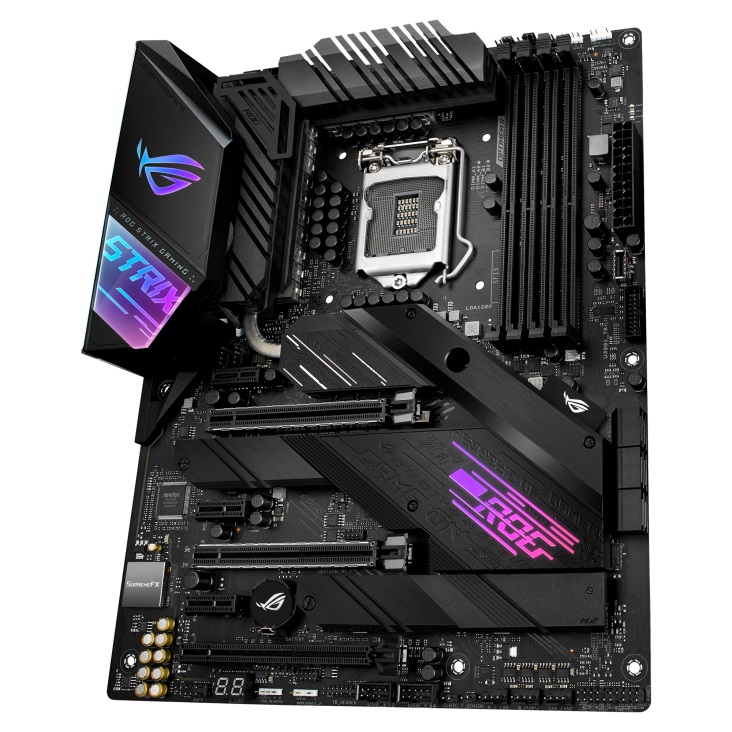
The Z490 series is based on PCIe 3.0 interface however, Asus has been kind enough to include PCIe 4.0 support on Rocket Lake CPUs, which is the 11th generation. This turns the primary PCIe 3.0 x16 slot into a PCIe 4.0 x16 slot. Apart from that, there are two PCIe 3.0 x16 slots and three PCIe 3.0 x1 slots. What might come as a disappointment is that there is no Gen4 support for the M.2 slots which some other competitors offer. Moreover, populating M.2 slots disables some SATA ports, so all of them can not be used simultaneously.
Moving on to the I/O ports, Asus has always ensured that enough connectivity is provided. This time around, there are four USB 3.2 Gen2 ports including one Type-C. Four USB 2.0 and two USB 3.2 Gen1 ports are also provided, so there is sufficient USB connectivity. However, the provision of thunderbolt port(s) would have made it even better. The networking side is handled by the Intel I225-V 2.5Gb LAN port and Intel WiFi 6 AX201 module.
The Asus ROG Strix Z490-E Gaming provides great performance and decent overclock headroom at a reasonable price tag. It dominates the Z490 zone of the market, hence we declare it the best Z490 motherboard for i9-11900K.
7. ASRock Z590m Pro4
Best Micro-ATX Motherboard For i9-11900k
Pros
- Decent Design
- Compact
- 6-Layer PCB For Improved Thermals
Cons
- Only 6 USB Ports
- Below Par Audio Codec
Form Factor: micro-ATX | Chipset: Z590 | Memory: 128GB @4800+MHz | Storage: 2x M.2, 4x SATA | Expansion Slots: 1x PCIe 4.0 x16, 1x PCIe 3.0 x16, 2x PCIe 3.0 x1 | USB Ports: 2x USB 3.2 Gen2 (Type-A), 2x USB 3.2 Gen1, 2x USB 2.0
A lot of us prefer a smaller form factor over the ATX, and why not – they’re generally cheaper and occupy less space. There aren’t a lot of micro-ATX motherboards built around the Z590 chipset, but do not despair, as the Z590m Pro4 from ASRock has got you covered.
ASRock always comes up with some of the most attractive aesthetics on their motherboards. The case is no different from the Z590m Pro4, which features a stylish black-and-gray themed PCB. The PCB is populated by silver heatsinks that are a prominent feature of this board’s aesthetics. The only RGB LEDs are found under the chipset heatsink, and can be configured using the ASRock exclusive Polychrome software. The ASRock logo is engraved on the chipset heatsink, while the I/O shroud proudly boasts the ‘PRO Series’ branding. In short, the design is well executed and would go well with any PC build. Since it is an m-ATX form factor motherboard, you might also like a nice micro-ATX case to go along with it.
The Z590m houses a 12-phase power design with 50A premium chokes which is similar to the Z590 Pro4 ATX version. The power circuitry is surrounded by two heatsinks that are responsible for carrying the heat away. A heatpipe connecting the heatsinks could have been a nice addition. However, only heatsinks are not enough which is why ASRock has included a six-layer PCB with three inner layers of copper. A chipset heatsink is also present at the bottom right of the board, however, it is not actively cooled. Overall, the motherboard has quite decent performance but overclocking can lead to serious thermal throttling.
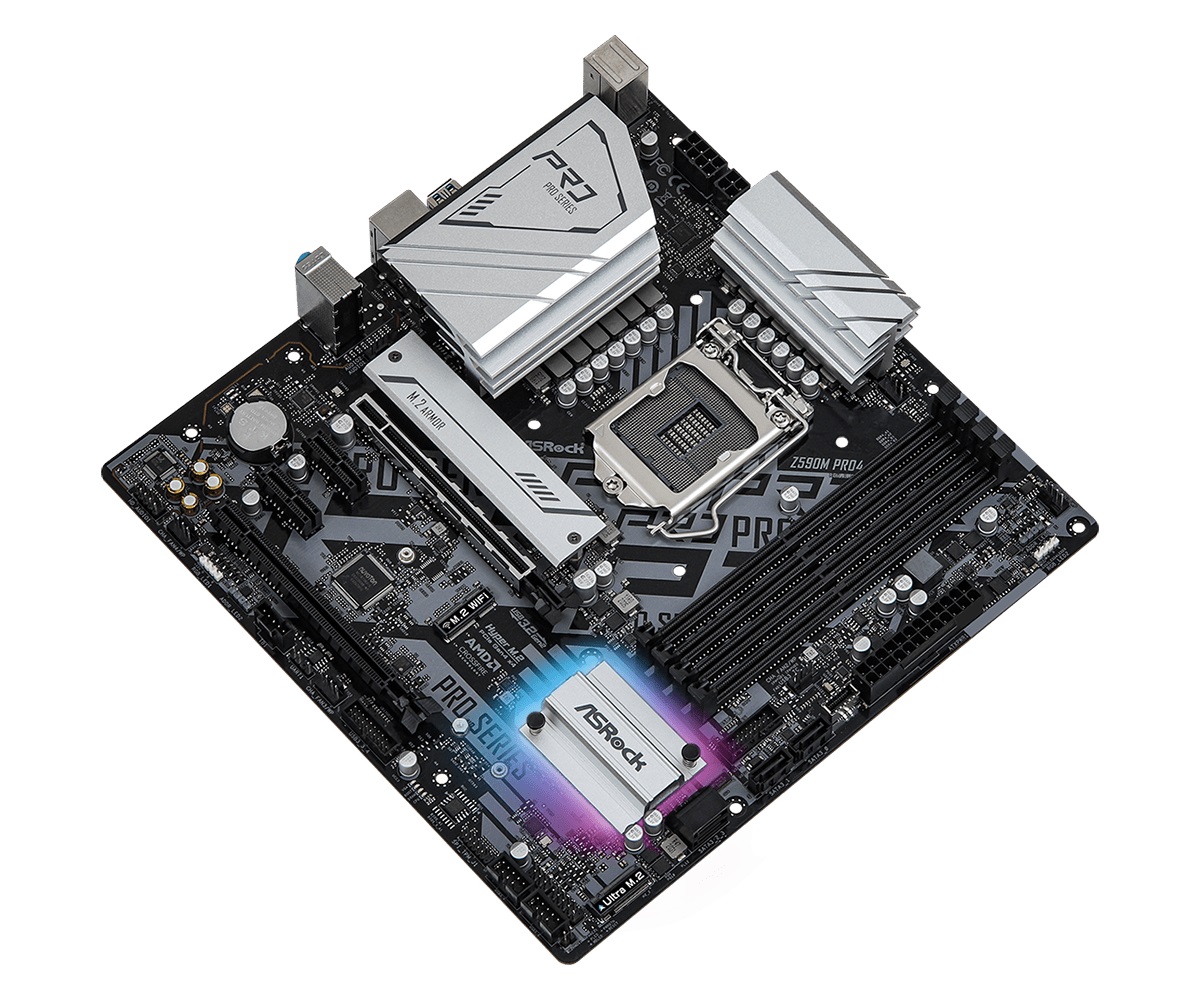
The inclusion of four DIMM slots is an impressive feat considering the m-ATX form factor of the Pro4. It supports 128GB of RAM at 4800+MHz overclocked speeds. In the storage department, the board has two M.2 slots with one Gen4 slot and four ports for your SATA SSDs. For expansion, the board offers a primary PCIe 4.0 x16 slot and another PCIe 3.0 x16 slot. Apart from that, two PCIe 3.0 x1 slots are also provided to link up drives such as PCIe WiFi cards.
Moving on to the rear I/O panel, it is relatively poorly equipped with only six USB ports. Two USB ports belong to each 2.0, 3.2 Gen1 and 3.2 Gen2 categories. One HDMI port and one display port is available in case you are still waiting for the graphics card shortage to end. However, here you can find the best temporary graphics card for the time being. The LAN port uses the Intel Gigabit LAN module. Lastly, there are three audio jacks powered by the rather substandard Realtek ALC897 audio codec.
Long story short, the Z590m Pro4 from ASRock is a killer motherboard from the mATX category. Its remarkable performance and abundant features make it worthy of earning the title of best micro-ATX motherboard for i9-11900K.
Things You Must Know About I9-11900k Motherboards
As we have already established, there are a lot of technicalities to consider when buying a motherboard. It is in no way a one-step process, and you have to take several factors into account before making the penultimate decision. Once you have your requirements checked, you’ll eventually land on the perfect motherboard for your i9-11900K. We also have a detailed motherboard buying guide that takes you all the way from the first step to the last step.
Chipset
The first and foremost thing to look out for in a motherboard is the chipset it packs. The 11th Gen i9 CPUs are compatible with all Z590, Z490, and B560 chipsets. The Z590 chipset is currently the flagship Intel chipset for motherboards, with full-fledged PCIe 4.0 support. If you want the best-of-the-best for your processor, then a Z590 motherboard is the way to go. An alternate route would be to opt for a Z490, save some money and invest it in a better graphics card. The B560 is out of our recommendations, due to its apparent inability to handle overclocking on high-TDP processors like the 11900K.
Socket
Each CPU has a specific form factor and design architecture that determines which type of socket it goes into. The Intel i9-11900K, for example, is only compatible with LGA1200 sockets. Therefore, you must look for a board that has the LGA1200 socket, otherwise, you’ll end up wasting your money. Almost all Z590 and Z490 motherboards are built around the LGA1200 socket, so they are the safest choices to opt for.
Form Factor
Another deciding factor that goes hand-in-hand with the socket is the form factor. There are three main form factors to choose from: ATX, micro-ATX, and mini-ITX. ATX is generally the preferred option, with micro-ATX offering the middle ground while mini-ITX is suited for compact builds. It’s always useful to know exactly which form factor to look for before heading out for motherboard shopping.
VRM
Perhaps the most undervalued yet important factor that should be considered is the VRM. Voltage Regulator Modules essentially regulate the flow of voltage coming into the CPU, thus ensuring uninterrupted operation and a stable supply of current. A solid VRM is a mandatory prerequisite if you’re looking to overclock a heavy processor such as the 11900K. A steady VRM also demands a highly efficient cooling system to prevent thermal throttling at those overclocked settings. Once you have found the perfect combination of VRM and cooling, you can extract the full power of the 11900K without any hurdles coming in your way.
Frequently Asked Questions
There’s no definite answer to this, as everyone has a different definition of the term ‘best’ in their books. We think that the Maximus XIII Hero is the best board for the 11900K in every aspect, and it is followed closely by the MEG Godlike Gaming from MSI. In the end, it all narrows down to your requirements and your budget; the entries on this list would most certainly be the safest picks for you.
The Z490 is fully compatible with Intel’s 11th generation series of CPUs. However, Z490 motherboards are not as powerful as their Z590 successors and are a viable option only if you have a constrained budget. Future-proofing is also an issue with the Z490, which is eliminated in the Z590 chipset.
Yes. The Z590 is the top-of-the-line chipset from Intel and was launched in competition with AMD’s flagship X570 chipset. It includes full support for the PCIe Gen 4 interface, which is the main selling point of this chipset. It is also worth mentioning that the Z590 is future-proof for the upcoming generations of Intel processors.
The post Best Motherboards For i9-11900k appeared first on Appuals.com.
 Check Price
Check Price
0 Commentaires